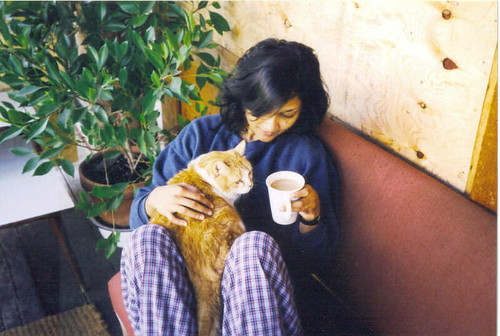Transmission by Hari Kunzru
 Transmission (2004)
Transmission (2004)by Hari Kunzru
Transmission is the second novel from the much-lauded young British author of The Impressionist, Hari Kunzru.
The book started off with a certain brilliance and wit that instantly drew me in and had me hooked.
The central character, Arjun Mehta, is from India. However, the story is not entirely set in India. In fact, it is not entirely set in any one place: it spans the globe - just like the title suggests - Transmission - spreads around the world.
Three plot lines are introduced in the first part of the book which we know (and expect) would somehow meet and mingle to a climactic end.
Arjun Mehta, a fairly introverted and nerdy young lad from India, manages to land a software job in the good old Silicon Valley, USA. Arriving full of dreams in this land of plenty, he finds that things are not quite as he had pictured. He is trapped in a binding, slave-trade-like contract which leaves him unemployed most of the time, sharing quarters with a few other Indians like himself, and barely receiving any wages worth writing/calling home about.
Guy Swift is a self-made millionaire (in paper at least) who is terribly plastic, indeterminate, and borderline self-destructive. His New-Age-ish company Tomorrow* manages to be funded by enterprising venture capitalists for a while, when his novel ideas seem like the Next Big Revolution in Marketing. A few awards and contracts later, Guy Swift manages to snag himself a posh living quarters in London and a spiffy girlfriend Gabriella. Of course, everything about Guy clearly points towards a spiraling collapse.
Leela Zahir is a much-adored young Bollywood starlet, complete with a pushy stage-mother living her own dreams through her daughter, who is discovering a budding disillusionment regarding her life in general. Sure she can emote and dance, but, can she retain her sanity?
The narration surrounding Arjun Mehta and the formulaic Bollywood movies in the first half of the book is incredibly entertaining and snappy, although it could be lost on a non-eclectic reader. Slowly, the book turns dark for a while, transforming Arjun and Guy into desperate men who act out, in their own ways, rather outrageously.
The second half of the book unfolds a chaotic turn of events at which point the book takes on a whimsical and exaggerated life of its own, pulling the reluctant reader along with that metaphorical carrot-stick that promises to tie it all together in the end.
Arjun's elusiveness despite being FBI's Most Wanted for unleashing the Leela virus, the complicated identity crisis Guy is put through as a result of Operation Atomium of the European border security, the unlikely tenuous bond between Gabriella and Leela that conveniently facilitates Leela's fanciful escape are all a bit too propitious and flamboyant to mesh with the story line thus far.
As a result, the ending is a bit too tidy, a bit too abrupt and unconvincing.
What I liked:
- Delightful style of writing: descriptions of Arjun Mehta's family, of Bollywood power dynamics, of Arjun's life in the US are all spot-on; the inanity of Tomorrow*'s ideology is almost comical; the little tidbits about auxiliary characters are uproarious
- Witty and insightful in parts: passages surrounding modern corporate culture, Arjun's tendency to seamlessly blend Bollywood scenarios with his personal life by conveniently ignoring the fictional aspect of the movies, the IT work ethic/culture are all presented with startling acumen and satire.
What I did not like:
- A bit disjointed: some of the characters were built up meticulously but didn't seem to matter to the plot line much in the end (like Rajiv Rana, Yves, Chris, even Gaby); some of the events seem to serve no purpose, not even that of building character in the character
- The Ending: it seemed like an easy way out; it seemed a bit too bizarre and forced; unsatisfactory
Bottomline: A creamy, charming work of fiction that could be a fun read on a long international flight with boring in-house entertainment.
Of course, my mood affects the choice of books I read - sometimes I gravitate towards heart-rending pathos, sometimes I just want simple fantasy; sometimes I cannot stay away from esoteric non-fiction, sometimes I crave for rollicking fiction...
I try not to restrict myself to a particular genre. In general, however, I have always been partial to non-fiction, and have always stayed away from fluffy romantic fiction.
I have just tasted but a drop of the ocean, picking and choosing the books I get to read in the limited time I can spare for this luxury, so, it is possible that I end up missing a few good ones...
Excerpts from Transmission:
Describing Arjun's mom:
As an Indian mother, Mrs.Mehta's prime directive was to ensure that her firstborn son was never more than ten feet away from a source of clean clothes, second helpings and moral guidance. She expected to have to release her child eventually, but only into the hands of another woman, whose family tree had been thoroughly vetted and whose housekeeping could be easily monitored from the vantage point of a chair in the living room of Eighteen Gleneagle House, into which the girl would naturally move.
Describing scenes from Arjun's favorite Hindi movie (Dilip and Aparna are the lead roles in the movie):
Despite Dilip's attempts to impress Aparna by riding a horse very fast, standing on his hands and boxing the ears of a group of eve-teasers in the marketplace, she remains unmoved, singing to him that the man who wins her heart should have more than a distinguished nose, flat abs and a happy-go-lucky manner; he should command the respect of his fellow citizens and hold down a high-paying job in commerce or industry.
...
Dilip discovers that a childhood of haggling in the Jalandhar market has given him an aptitude for finance, and in no time at all he is vastly wealthy.
...
Aparna sings to him of her undying love... they go walking by the Thames, on the white cliffs of Dover, on the battlements of Windsor Castle and briefly in the Swiss Alps, wearing a variety of outfits and describing the life they will lead together once they are united in marriage.
...
In a fantasy sequence, the action switches to Punjab, and Aparna (whose modern London clothes have been swapped for traditional wet sari) sings that Dilip has won her heart through bravery, decisiveness and diversified investment portfolio.
Describing Arjun's musings while in California:
The idea of American poverty, especially a poverty that did not exclude cars, refrigerators, cable TV or obesity, was a new and disturbing paradox, a hint that something ungovernable and threatening lurked beneath the reflective surface of California.
Labels: book review, fiction


0 Comments:
Post a Comment
<< Home